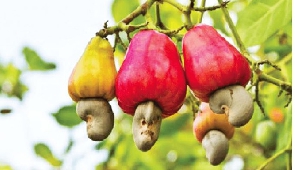There is the need for comprehensive and industry-specific policies to help revive the ailing cashew processing sector in the country, Patricio Lima Assis, Managing Director of USIBRAS Ghana Limited, subsidiary of a leading cashew nut processing firm with four units in Brazil, Africa and USA, has advocated.
He said the government should protect Ghanaian cashew processing companies against their competitors in highly subsidized economies like India and Vietnam, by offering incentives such as tax reliefs, affordable agro-processing credit facilities and support to acquire state-of-the-art industrial equipment as well as discourage excessive export of raw cashew nuts (RCN) to guarantee processors with the needed raw material.
Already, the price of cashew on the world market has collapsed as a result of COVID-19 and the processors which pushed the two major cashew processors and exporters of kernels, Vietnam and India, to slash processing and export volumes, thus further impacting negatively on global pricing of raw cashew nut (RCN).
The 2020 cashew season opened with a price of GH¢7/kg. Within a matter of a month, the price took a nosedive to low as GH¢2.5/kg. The drastic reduction in RCN price was largely influenced by the COVID-19 pandemic but the local price is gradually picking up; as at the first week of May 2020, it was around GH¢3.5 to GH¢4.5/kg.
The price collapse and challenging economic environment has seen only two processors out of 12 still in operation with the rest shutting down. Even among the two cashew factories in business, they operate below their optimal capacities. For instance, USIBRAS Ghana Limited, the Brazilian owned cashew company has a processing capacity of 30,000 metric tonnes per year but its processing volume is around 15,000 to 20,000 mt.
In an interview with the B&FT, on the sidelines of a forum organised by the Ministry of Food and Agriculture (MoFA) in Sunyani, Mr. Assis bemoaned excessive exportation of cashew in its raw form, indicating that the trend denies the country the actual benefits from the commodity along its value chain.
The situation, he noted, is unreservedly starving processing companies because the sub-sector has a potential to create thousands of job opportunities. Currently, USIBRAS alone has a workforce of 600.
“We need a strong processing capacity in the country. As authorities make effort to increase farmers’ production and productivity levels, there must also be similar commitment to value-addition. Let’s take a cue from Vietnam and India, they have developed their production base as well as processing factories. These two countries process every RCN produced in their countries with supplementary from Africa,” he said.
Cashew is the leading Non-Traditional Export (NTE) commodity in the country. Statistics from the Ghana Export Promotion Authority (GEPA) indicate that in 2018, the commodity fetched the country US$378.21 million (export earnings), surging by 43.84 percent from US$262.95 million in 2017. This exports earnings he noted, could be multiplied if value addition is effectively and efficiently done.
Price negotiation
The forum by the Ministry of Food and Agriculture (MoFA) was designed for USIBRAS Ghana Limited to meet farmers’ leadership to negotiate for mutually beneficial price. After hours of negotiation, the two parties settled at GH¢4.2 per kilogramme of RCN.
The USIBRAS Boss said COVID-19 has destabilised the global cashew market and therefore important for farmers to water down their price expectation for 2020 season. “Let’s acknowledge that we are not in normal times; despite the uncertainties, we are here to offer a stable price and also support you with good farm practices such as pruning and organic weed control practice during the lean season.”
National Secretary of Cashew Farmers Association, Clement Anane applauded MoFA for the initiative to link farmers to processors. “This a good move to salvage farmers from the annual ritual of price instability, especially in this era of COVID-19. I know that when the Tree Crop Development Authority becomes operational, issues about pricing will be resolved.”
The Bono Regional Director of MoFA, Assan Donkor, advised farmers to take advantage of government interventions like mass spraying and distribution of improved seedlings to expand their farms so as to enhance production and productivity. He also urged them [famers] to embrace win-win approach in price negotiation to help develop the cashew sector along its value chain.
Click to view details



Business News of Tuesday, 12 May 2020
Source: thebftonline.com

















